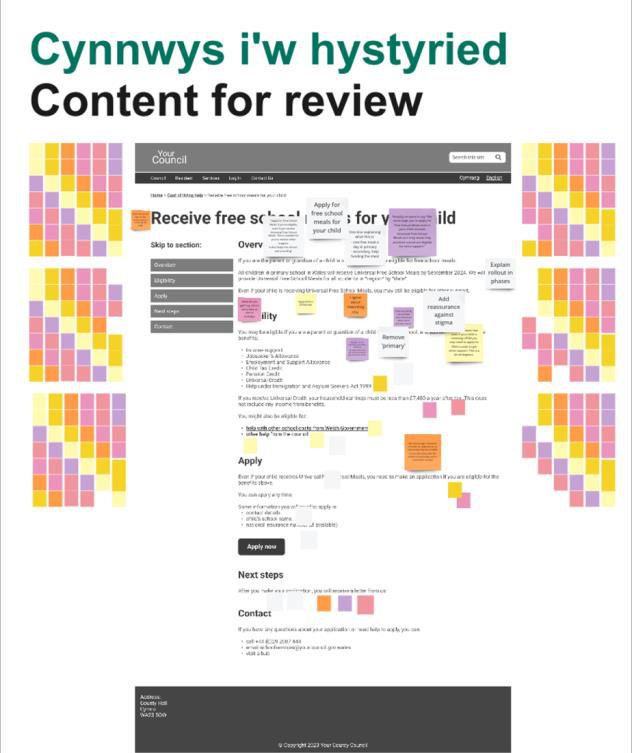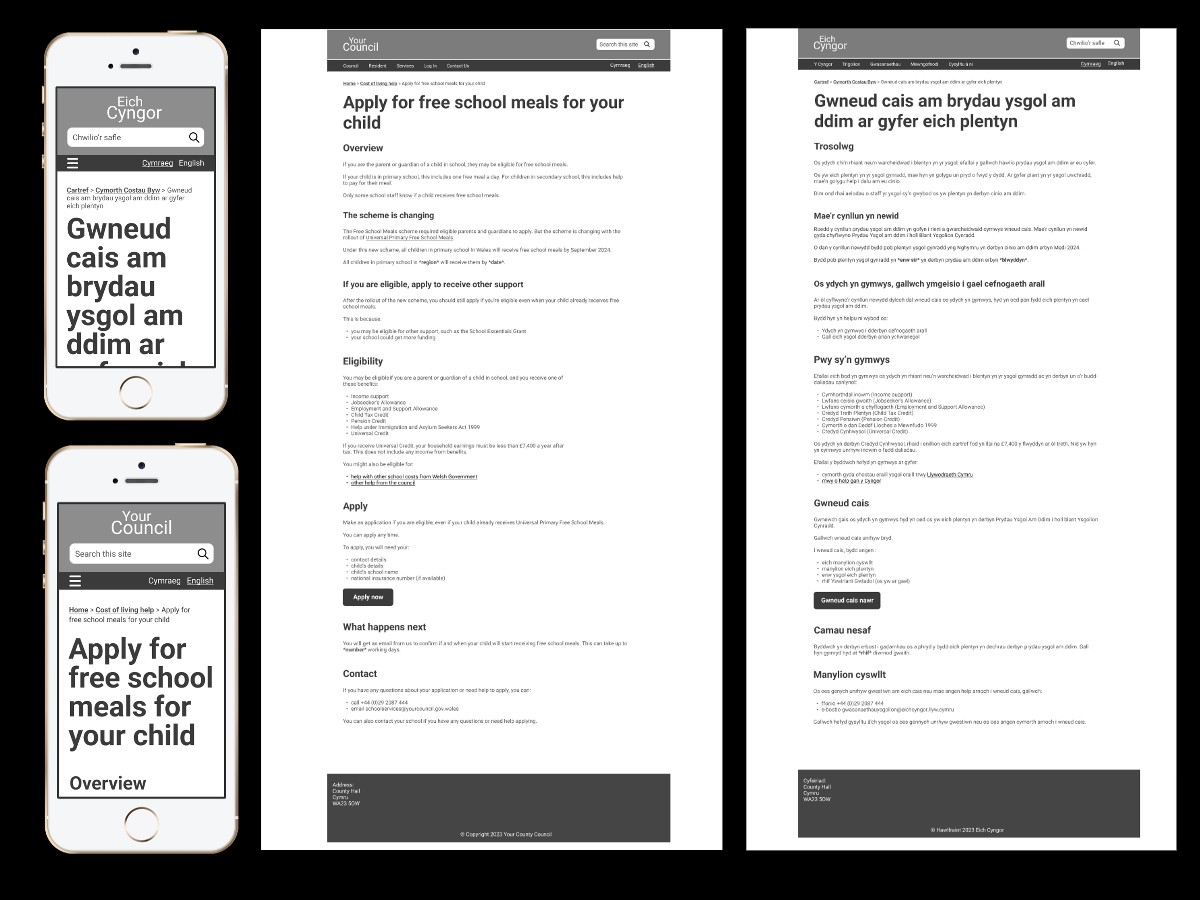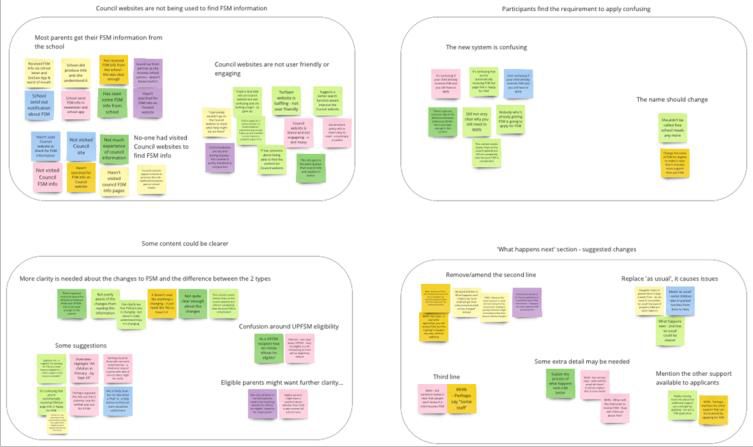Contents
Overview
These are the steps that we took whilst working on co-designing content for the Free Schools Meals support.
We have also published reusable content, tools and templates that you can use for your own local authority sites.
User stories
Following desk research, we developed user stories. These allow us to understand the motives of our users and how this content can help them.
As a… person in need of financial help
I want to… know who this support is for
So that I… understand whether I’m eligible
As a… parent or guardian in need of financial help
I want to… know what this is for
So that I… decide whether to apply.
As a… parent or guardian in need of financial help
I want to… know what the eligibility criteria is
So that I… don't apply for support I'm not eligible for.
As a… person applying for this support
I want to… know when I need to apply
So that I… don't miss the deadline.
As a... person applying for this support
I want to... understand how to apply
So that I... can make sure I follow the right process
As a… person applying for this support
I want to… know what information I need to apply
So that I… can have all the information ready.
As a… person applying for this support
I want to… know when my child will start receiving free school meals
So that I can… plan and budget ahead
As a… person applying for this support
I want to… know what the next steps are
So that I… feel reassured with clear expectations.
As a… person applying for this support
I want to… know if there’s other support I may be eligible for
So that I… can apply and receive additional support
As a… parent or guardian of a child in school
I want to… know the difference between FSM and UPFSM
So that I… know whether I need to apply or not
Acceptance criteria
We use acceptance criteria from the perspective of the user. They allow us to know when we have succeeded. The job is done when:
I know...
- if I’m eligible or not for this support
- what the support is for
- how it works
- what the eligibility criteria is
- when I need to apply
- how to apply
- what information I need to apply
- what happens next
- about the rollout of Universal Free School Meals by 2024
I feel...
- reassured that I understand everything I need to apply for this support
- supported and not judged
- clear and certain
- confident in my decision and the process
I can... apply for the support successfully
Workshops
We ran online workshops during the project. They were for:
- identifying user needs with local authorities
- showing local authorities how users experience content that’s not user-centred
- trio writing user-centred content with a subject expert from Welsh Government
- reviewing the new content with local authorities and Welsh Government stakeholders



Prototyping
We built a prototype to test and develop ideas with users.
We built a medium-fidelity interactive prototype in a programme called Figma. Figma is a ‘no-code’ piece of software which meant it was a solid choice for quickly building the environment to house the bilingual content we had designed.
We designed it to feel familiar to users, with:
- Gov stylings
- a mixture of local authority websites
- both desktop and mobile versions
Once we designed them, we had to test them with potential users. We tested it depending on the device a participant would usually use.

Usability testing
We conducted a round of usability testing to review and test the prototype Free School Meals web page. This prototype had the new content drafted with input from local authorities.
Goals of the usability testing
We wanted to know whether users found this content understandable, accurate, consistent and accessible. In particular, we wanted to find out:
- if the content was clear and easy to understand
- whether the content contained all the right information
- if the Welsh language content was of an equal standard to the English
Participants
We were able to recruit participant through the Gwent Parent Governors Network. We had 200 responses, with most added to our user research participant panel.
We found it more difficult to recruit Welsh language participants.
We tested with 4 English-speaking participants from a range of local authorities in south east Wales, and 3 Welsh-speakers from north and south Wales.
We gathered some useful insight to take forward into analysis.
How we did it
We conducted the testing remotely and asked participants questions about:
- the structure of the content
- how easy it was to understand the content
- whether the content contained all the information the participant needed
Findings
- Most participants mentioned their negative experiences of using council websites
- Participants aren’t proactively using council websites to get information about Free School Meals. They hear about free school meals from school emails and newsletters.
- Participants don’t find council websites user-friendly
- Participants were confused by the changes to Free School Meals, and by the fact that some parents are encouraged to apply even when they automatically receive Free School Meals
- Some parents are concerned about the stigma attached to receiving Free School Meals
- First-language Welsh speakers are not familiar with the Welsh names of services
- Most participants access cost of living information on their mobile devices
- Parents on benefits are not aware or checking what support they may be eligible for

Content templates
Free School Meals content 2023 to 2024.docx
Content that you can reuse on your local authority website about the Free School Meals support.
Free School Meals HTML English.html
You can reuse this HTML version of the English-language Free School Meals content.
Free School Meals HTML Cymraeg.html
You can reuse this HTML version of the Welsh-language Free School Meals content.
Contact us
Contact ed.cann@digitalpublicservices.gov.wales to take part in future projects with us.